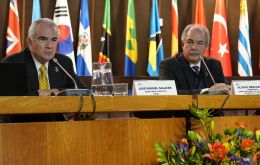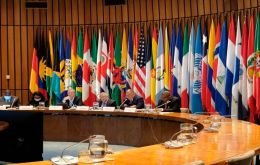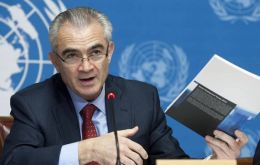MercoPress. South Atlantic News Agency
Tag: ECLAC
-
Wednesday, November 8th 2023 - 09:01 UTC
Peña praises ECLAC and wants more Chilean investments in Paraguay

Paraguayan President Santiago Peña spoke Tuesday in favor of free trade and environmental protection during his appearance before the Economic Commission for Latin America (ECLAC) at its Santiago (Chile) headquarters.
-
Monday, November 6th 2023 - 09:54 UTC
Paraguayan President off to Chile for 3-day state visit

Paraguayan President Santiago Peña will be traveling to Santiago for a meeting with his Chilean colleague Gabriel Boric Font on Monday and a conference at the Economic Commission for Latin America and the Caribbean (ECLAC) on Tuesday, among other engagements. Peña will stay in the Chilean capital until Nov. 8, it was also announced.
-
Wednesday, September 27th 2023 - 09:45 UTC
No agreement reached during Paraná Waterway multilateral meeting

Argentina will continue to charge a toll to barges sailing through the Paraná River Waterway after no agreement was reached Tuesday during a Technical Commission meeting at the Brazilian Embassy in Buenos Aires.
-
Thursday, September 7th 2023 - 10:39 UTC
ECLAC's outlook for the region is grim, but better than in April

The latest report from the Economic Commission for Latin America and the Caribbean (ECLAC) released Tuesday in Santiago foresees low regional growth for at least the next two years. For 2023, the organization projects a 1.7% increase in the Gross Domestic Product (GDP) while in 2024 it would fall to 1.5%, while the world's GDP is expected to grow by 3% in 2023 and 2024, down from 3.5% in 2022.
-
Friday, July 7th 2023 - 10:59 UTC
ECLAC highlights the importance of a lithium agenda for Latin America

The Economic Commission for Latin America and the Caribbean (ECLAC) Thursday published a report called “Extraction and industrialization of lithium. Opportunities and challenges for Latin America and the Caribbean,” recommending the region's countries devise a productive development agenda around lithium to promote its extraction for the benefit of economic activities directly and indirectly related to the mineral.
-
Wednesday, June 14th 2023 - 09:20 UTC
AMLO picks former ECLAC boss for FM post

Mexican President Andrés Manuel López Obrador (AMLO) Tuesday announced he had picked former Economic Commission for Latin America and the Caribbean (ECLAC) Executive Secretary Alicia Bárcena as the country's next foreign minister following the resignation of Marcelo Ebrard to devote himself to his electoral run.
-
Thursday, January 19th 2023 - 19:46 UTC
ECLAC sees great stress ahead for Latin America

The Economic Commission for Latin America and the Caribbean (ECLAC) foresees “great stress” and a “cascade of crises” including rampant inflation and increasing climate change that will affect the livelihoods of people in the region.
-
Wednesday, January 11th 2023 - 10:13 UTC
Price increases boost Latin American exports in 2022

Latin American exports grew 20% in 2022 due to increases in the price of goods, according to projections featured in a report from the Economic Commission for Latin America and the Caribbean (ECLAC) released this week.
-
Wednesday, January 4th 2023 - 12:52 UTC
Latin America forecasted to expand 1,3% in 2023, after growing 3,7% last year, ECLAC report

In its annual report Preliminary Overview of the Economies of Latin America and the Caribbean, the UN Economic Commission for Latin America and the Caribbean, ECLAC projects that regional growth next year will be a third of the rate forecast for 2022.
-
Wednesday, December 14th 2022 - 19:41 UTC
Governments need to address aging issues, ECLAC insists

The Economic Commission for Latin America and the Caribbean (ECLAC) urged governments in the region this week to address the issue of aging people during the V Regional Conference on Aging and the Rights of Older Persons in Santiago.
